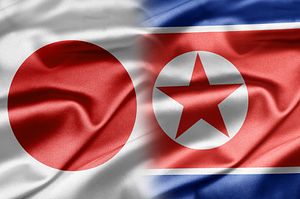Japan announced on Wednesday that another round of talks with North Korea will take place next week on July 1, as it seeks to check Pyongyang’s progress concerning its ongoing investigation into the abduction of Japanese citizens in the 1970s and 80s. North Korea appears to be staying on track with its part of their agreement, as Japan has promised reduced sanctions and humanitarian aid. These negotiations are happening as both sides find themselves heavily engaged otherwise, although Japan more so than North Korea. Next week’s meeting will occur as Japanese Prime Minister Shinzo Abe is scheduled to announce a Cabinet position affirming collective self-defense, a change in the interpretation of Japan’s Constitution designed to address threats like North Korea. Pyongyang is also experiencing a record drought in some parts of the country, which could necessitate the need for Japanese aid quickly, and cause the leadership to tighten its grip on authority.
On Wednesday, the AFP reported that Japanese Foreign Minister Fumio Kishida said that during the meeting next Tuesday in Beijing, the North planned to “explain about the organization, composition and persons in charge” of DPRK’s investigation into the abductions. Abe was also briefed by Vice Foreign Minister Akitaka Saiki on the progress of the meeting, which will again be chaired by Junichi Ihara on the Japanese side and Song Il Ho on the North Korea side, the two men responsible for negotiating the initial agreement in May. Japanese official have signaled that Tokyo intends to lift some sanctions if the framework for North Korea’s investigation is found to be appropriate. The return of all, or even some of the Japanese abductees would be a huge political victory for Abe, who has even suggested he may visit Pyongyang if further progress is made in the investigation.
The negotiations could also be very important for North Korea as well, and for multiple reasons. The most immediately pressing may be news of a potential drought. Pyongyang’s official KCNA said tens of thousands of hectares of farmland have been damaged. It is reportedly the worst drought in a decade, with some areas having record low rainfalls not seen since 1961. The state media outlet said office workers have been mobilized to help irrigate the worst hit areas, while Reuters reported that part of the army had been mobilized to protect undamaged crops.
Aside from lifting sanctions and receiving Japanese aid to address this immediate concern, North Korea has several other strategic reasons for cooperating over the Japanese abductions. By reducing tension with Japan, and perhaps leading toward some sort of unofficial détente, North Korea could hope to drive a wedge in the U.S.-South Korean-Japanese security pact allied against it. While Japan would certainly not break with its current alliance, especially with the U.S., it could be expected to be less aggressive toward Pyongyang, especially if it becomes involved in investing in North Korea’s special economic zones.
Leader Kim Jong-un could also be looking to balance against its overwhelming dependence on China, which provides 90 percent of its energy imports and 45 percent of its food. North Korea’s Rason special economic zone could potentially be a recipient of Japanese capital in the future, which has already seen investment from China, Russia and Mongolia. As Japanese companies sit on large pools of capital, a nearby source of cheap Korean labor would be very attractive if relations between the two countries were stabilized.
KCNA this week also denounced Japan’s review of its 1993 Kono statement which apologized for Imperial Japan’s use of comfort women during the Second World War. Japan’s choice to revive this issue has the potential to derail next week’s talks, especially in tandem with the Abe government’s planned announcement on collective self-defense. Even though aid and potentially reducing its international isolation are important for North Korea’s leadership, the importance of being perceived domestically as strong and unyielding is paramount, and could cause Pyongyang to turn its back and tighten its belt yet again.
Additionally, any progress on the abduction issue could give Abe significant political capital, which would be useful in implementing his “third arrow” of economic reforms released just this week. For example, by appeasing parts of his conservative political base, Abe could generate the support needed to move forward with agricultural reform that is unpopular with Japan’s older, rural population. While North Korea appears to have more to lose by leaving these negotiations, the potential upsides for Japan if they succeed should be enough to motivate the Japanese government to avoid unrelated nationalistic issues.

































